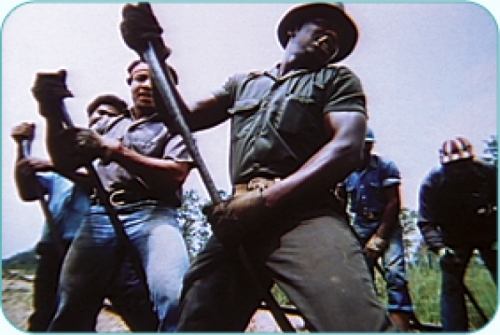Cowboy Poets. A Jumpin’ Night in the Garden of Eden. Pizza Pizza Daddy-O. Ray Lum: Mule Trader.
These are movies you’ll probably never see in the theater, or even on cable TV. Despite the fact that folklore is a part of our everyday lives, documentary films about American folk and roots culture are hard to find. But they’re testimonies to our heritage, and now they’re available to scholars and students everywhere.
Collaborators in a project called Folkstreams.net have been hard at work gathering together these far-flung documentary films to create an online national preserve. In 2000 Tom Davenport and his fellow filmmaker and folklorist Daniel Patterson pulled together a group of scholars, filmmakers, and computer specialists to unveil some forty films online with the help of a grant from the National Endowment for the Humanities.
“Folklore is the ongoing construction of culture,” says Paul Jones, who has been leading UNC’s efforts on this emergent project. We create folklore every day when we invent and share stories through word of mouth with people in our ethnic, religious, and occupational circles. The unwritten tales and legends of our society include a wide range of eclectic subjects that might not immediately come to mind.
“These films are about everything from musicians to boat-builders,” Jones says. “Until now, many of these films existed only in the hands of the filmmakers. They’ve been invisible for a long time. But the reason filmmakers make films in the first place is so that people will see them.”
So the Folkstreams.net folks sought out the participation of dozens of independent filmmakers who gave permission to make their works available to the public at no cost. But the partners found that pulling the videos out of the filmmakers’ barns and dusty cabinets would be the simple part. Archiving them and making them easily viewable would be trickier.
The team decided to use video streaming for the Folkstreams.net site. Unlike downloading the video — which takes longer than most of us are willing to wait and could lead to infringement on the ownership rights of the filmmaker — video streaming buffers the film a few seconds ahead of itself so that you can watch the video as it’s coming to your computer. Your hard drive then discards what you’ve already watched. With video streaming, the film “is only temporarily passing through your computer,” Jones says.
They also created a digital archival recording of each film as a reference copy. All non-digital copies, most often created on 16 mm film, are archived at the Southern Folklife Collection at UNC. The films Folkstreams.net takes in are from the 1950s through the 1990s, and some older formats are “basically suffering from format-rot,” Jones says. One day soon the technology to read 16 mm film might not exist. Without archival backup copies, we run the risk of losing these films forever.
Folkstreams.net offers extensive background materials that provide facts about the subject matter and the history of each film. Biographies, transcripts, and bibliographies supplement the full-length videos. But the NEH grant covered only the beginning of the team’s visualization.
“Not only do we want more films,” Jones says, “we want more and better supporting material.” Folkstreams.net is the only non-commercial resource of its kind. As of today, the site boasts fifty-five videos available to its users and gets up to five hundred hits a day.
“Heretofore, much good independent film work was like the tree falling in the wilderness with no one to hear,” Davenport says. “With the internet and video streaming, we will be able to make a national park from this wilderness.”
Folkstreams.net is a collaboration of Folkstreams, Inc. and Carolina’s ibiblio.org, Southern Folklife Collection, and School of Information and Library Science. The project was conceived by Tom Davenport, Folkstreams.net project director. Paul Jones managed the organization’s most recent grant from the Institute of Museum and Library Services; he is director of ibiblio.org and a professor in Carolina’s School of Information and Library Science and the School of Journalism and Mass Communication. Members of the Folkstreams.net advisory committee also include UNC’s Glenn Hinson, chair of the Curriculum in Folklore; Steve Weiss, Southern Folklife Collection librarian; and Rob Roberts, graduate student of journalism.


